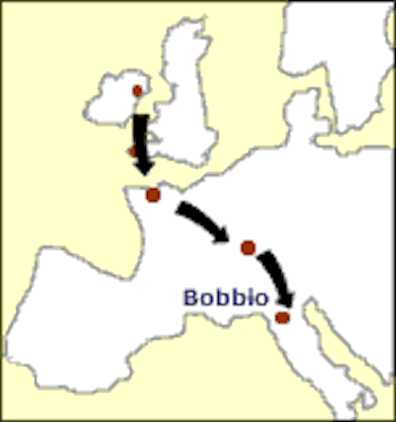The "fiery Columbanus" (ca. 540-615) of whom Stephen thinks
in Nestor and again in Proteus was an Irish
monk who carried Christianity to continental Europe during the
Dark Ages, founding monasteries in the feudal kingdoms of what
are now France and northern Italy. According to Alban Butler's Lives of the
Saints, he left his mother in Ireland "grievously
against her will," and in Nestor Stephen thinks of
him striding across his forlorn mother's "prostrate body" in
his "holy zeal" to spread the gospel.
Columbanus was famous not only for great learning and
eloquence, but also for impetuous, headstrong passion. Stephen
identifies with him as a man who broke away from home to go to
France, and as someone who repaid
his mother's love with injurious independence. In Proteus,
he unflatteringly compares himself to Columbanus: "You
were going to do wonders, what? Missionary to Europe after
fiery Columbanus." The thought of what a poor
figure he cut in France leads him to think of two other Irish
missionaries to the continent, laughing at him from their
heavenly vantage: "Fiacre and Scotus on their
creepystools in heaven spilt from their pintpots,
loudlatinlaughing: Euge! Euge!" The Latin
exclamation means something like "Well done!" or "Bravo!"
Mockers shout the phrase ironically several times in the
Vulgate versions of Psalms and Ezekiel.
Saint Fiacre built a small monastery in France in the 7th
century. The other figure could be either John Scotus
Eriugena, a 9th century Neoplatonist theologian, or John Duns
Scotus, a late 13th century Scholastic philosopher. Both men
were reputedly Irish (the epithet Scotus was given to
both Scottish and Irish clergymen), and both are mentioned in
Joyce's lecture "Ireland, Island
of Saints and Sages"––they and Columbanus are the saints
on whom the lecture primarily meditates. Thornton votes for
Duns Scotus on the basis of a passage in Joyce's Alphabetical
Notebook which served as a rough draft for the passage
in Proteus. It mentions Duns Scotus in connection
with Fiacre and Columbanus, and puts them on "creepy-stools in
heaven." Slote puts his money on Eriugena.
Columbanus and Fiacre make another brief appearance in the
novel in Cyclops, when Martin Cunningham's remark,
"God bless all here is my prayer," triggers the appearance of
many dozens of "mitred abbots and priors and guardians and
monks and friars."


